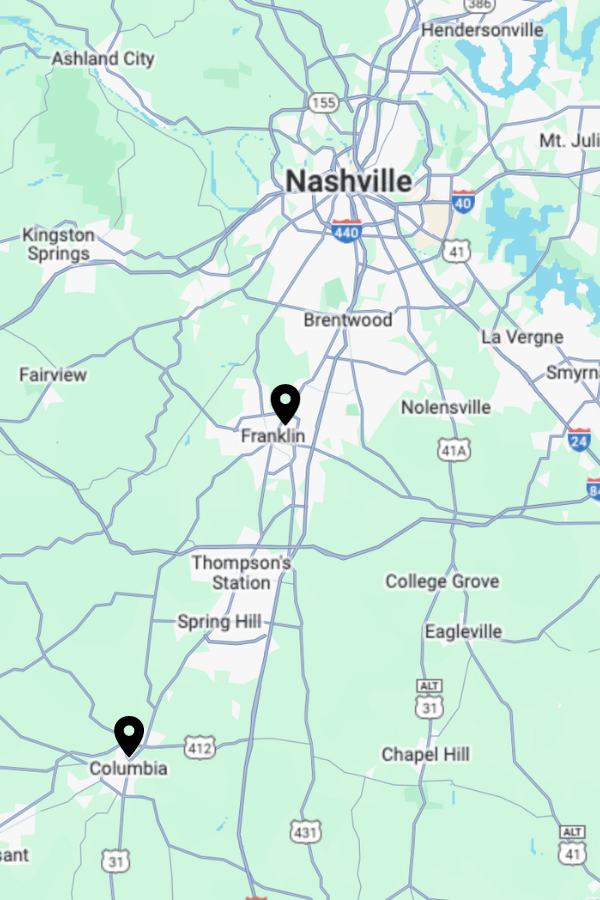Apex Addiction Recovery Center in Tennessee offers a variety of rehab programs, including the unique option of animal-assisted therapy. This innovative approach underscores Apex’s commitment to holistic recovery, recognizing the profound benefits animals can provide in the healing process. Through these diverse programs, Apex helps provide comprehensive support for people on their journey to sobriety.
Apex Addiction Recovery Center partners and is in-network with several health insurance providers, ensuring accessibility to their treatment programs. Additionally, we extend insurance coverage to include animal-assisted therapy, making our rehabilitation services inclusive and financially viable for people seeking recovery from addiction.

What Is Animal Assisted Therapy for Rehab Treatment?
What is animal assisted therapy? Animal-assisted therapy for rehab treatment, or AAT, incorporates trained animals into therapeutic sessions in the recovery process. This form of therapy utilizes the calming and comforting presence of animals to reduce stress, promote emotional well-being, and improve social skills. Clients may interact with therapy animals through activities such as grooming, walking, or spending time together.
The presence of animals can also foster a sense of responsibility and connection, helping people in rehab build trust and empathy. Overall, animal-assisted therapy serves as a complementary approach to traditional rehab methods, offering unique benefits and enhancing the overall effectiveness of the treatment process.
Free Addiction Assessment
Schedule a free, confidential assessment with a licensed clinician. Apex Recovery can check your insurance coverage levels for drug and alcohol addiction, and mental health treatment.
What is a Pet-Friendly Drug and Alcohol Rehab Center in Tennessee?
A pet friendly rehab in Tennessee is a facility that allows clients to bring their pets during treatment. These centers recognize the importance of the animal-human bond in the recovery process and provide a supportive environment that accommodates both the patient’s needs and their pet’s presence.
Clients benefit from the animal companionship and emotional support of their pets, which can aid in stress reduction and promote a sense of well-being during rehab. Pet-friendly rehab centers often have designated areas or policies in place to ensure the safety and welfare of both clients and their pets throughout the treatment program.
Tennessee Statewide Statistics on Animal-Assisted Therapy
Studies, including those from the National Institutes of Health (NIH), highlight the benefits of Animal-Assisted Therapy (AAT). Participants in AAT programs showed improved daily skills, motivation, cooperation, and therapy involvement. AAT also resulted in reduced impulsiveness and decreased anxious activation in rehabilitation sessions.
Interaction with animals releases hormones like oxytocin and serotonin, promoting relaxation and lower blood pressure. Owning and interacting with pets is believed to enhance mental health, with approximately 47% of respondents in one survey expressing this belief. Furthermore, there are around 500,000 service dogs in the U.S., and dog therapy has been linked to a 36% reduction in heart disease risk.

- Please complete and send the form below.
- One of our staff members will contact your insurer to check your coverage.
- We will contact you promptly with the results and to discuss the next steps.
Insurance Verification
"*" indicates required fields
Do Drug and Alcohol Addiction Rehab Centers Allow Pets and Animals During Treatment?
Some drug and alcohol addiction rehab centers do allow pets and animals during treatment, while others may not have such accommodations. If you’re considering treatment options and are interested in bringing your pet along, it’s important to inquire directly with the rehab center.
Apex Recovery, for example, may offer pet-friendly options, but it’s best to discuss your specific needs and concerns with their staff. By reaching out to Apex directly, you can get detailed information about our policies regarding pets during treatment and determine if it’s the right fit for you and your furry companion.

Are There Pet-Friendly Drug and Alcohol Rehab Facilities in Tennessee?
Yes, there are pet-friendly drug and alcohol rehab facilities in Tennessee. To explore these options further, including availability and specific accommodations, reach out to Apex Recovery at (877) 881-2689. We have two locations in Tennessee: APEX Recovery Franklin and APEX Recovery.
Apex Recovery Franklin
4601 Carothers Pkwy STE 250A
Franklin, TN 37067
Apex Recovery Columbia
2710 Trotwood Ave STE A & B
Columbia, TN 38401
How To Find Animal-Assisted Therapy in Tennessee (TN)
To locate animal assisted therapy in Tennessee, follow these steps:
- Utilize Online Search Engines: Kick off your search by utilizing online search engines like Google, Bing, or Yahoo. Use search terms such as “animal-assisted therapy near me” or “pet therapy programs in Tennessee” to pinpoint nearby facilities or organizations offering AAT.
- Explore Rehabilitation Centers and Clinics: Contact rehabilitation centers to learn about animal therapy for mental health in Tennessee. Some healthcare facilities integrate AAT with their therapeutic animals activities and services. Connect with their mental health animal therapy specialists for relevant information. You can also compare AAT with other programs, including inpatient, Partial Hospitalization Programs (PHP), and Intensive Outpatient Programs (IOP).
- Engage with Local Animal Organizations: Reach out to local animal-assisted therapy organizations or animal welfare groups. They may directly provide AAT services or refer you to practitioners or facilities offering such programs in your vicinity.
- Tap into Social Media and Online Communities: Join online communities or forums related to therapy, mental health, or animal welfare. Seek recommendations or post inquiries to gather insights from individuals who may have experience with AAT programs in Tennessee.Check Professional Associations: Investigate if there are professional associations or organizations dedicated to pet-assisted therapy in the region. They may offer directories or resources to assist you in locating AAT practitioners or facilities nearby.
- Directly Contact Therapists: Upon identifying potential AAT practitioners or facilities, reach out to them directly. Inquire about their services, availability, treatment approach, and any specific qualifications or certifications related to animal-assisted therapy.
- Connect with Veterinary Clinics: Get in touch with local veterinary clinics or animal shelters in Tennessee. They might possess information about AAT programs or therapists offering services nearby. Veterinarians and animal care professionals often maintain connections with AAT practitioners.

Popular Local Attractions Near Nashville, Tennessee
Nashville, Tennessee, and its surrounding areas boast a plethora of popular attractions. Music enthusiasts can immerse themselves in the rich history of country music at landmark venues such as the Grand Ole Opry and Ryman Auditorium, while sports fans can catch thrilling events at Bridgestone Arena.
For those seeking cultural experiences, the Country Music Hall of Fame and Museum offers insight into the genre’s legends, while the Frist Art Museum showcases a wide range of artistic styles. Nature lovers can explore the serene landscapes of Percy Warner Park or embark on underground adventures at Cumberland Caverns. Additionally, history buffs can delve into the past at sites like Andrew Jackson’s Hermitage and Belle Meade Historic Site, providing glimpses into Tennessee’s storied heritage. Whether indulging in world-class performances at the Nashville Symphony Schermerhorn Symphony Center or exploring the vibrant culinary scene, there’s no shortage of memorable experiences to be had in Music City and its surrounding areas. Plus, there’s even more to see a short distance away, like Elvis Presley’s Graceland in Memphis, Knoxville, and in the Smoky Mountains.
Does Health Insurance Cover Pet-Friendly Rehab Facilities in the Volunteer State?
Health insurance coverage for pet-friendly rehab facilities in Tennessee varies depending on the specific insurance plan and provider. While some insurance policies may include coverage for rehabilitation services, including those offered at pet-friendly facilities, others may not explicitly cover such accommodations.
It’s essential to contact Apex Drug and Alcohol Addiction Recovery Center to inquire about coverage options for our rehab treatment, particularly if you’re interested in facilities like ours that accommodate pets. Contact us to explore potential payment options or financial assistance programs and provide clarity on affordability and available resources. We can check your insurance quickly to see your options.
How Much Does Animal-Assisted Therapy and Rehab Cost Without Health Insurance Coverage in Tennessee?
The cost of animal-assisted therapy and rehab in Tennessee without health insurance coverage varies depending on factors such as the duration and intensity of treatment, the specific services provided, and the facility’s pricing structure. Generally, animal-assisted therapy sessions may range from $50 to $150 per hour, while comprehensive rehab programs range from several thousand to tens of thousands of dollars.
Additional expenses may include assessments, evaluations, and any specialized equipment or accommodations. You should inquire directly with Apex Substance Addiction Recovery Center to obtain accurate pricing information and explore potential payment plans or financial assistance options. Call us at (877) 881-2689 or contact us online today.
Does Health Insurance Cover Animal-Therapy Treatment in the Volunteer State?
Health insurance coverage for animal-therapy treatment in the Volunteer State can fluctuate depending on the specific insurance plan and provider. Some insurance policies may include coverage for certain types of therapy, including animal-assisted therapy, as part of mental health or rehabilitation services.
However, coverage specifics may differ for animal-therapy treatment. Discuss your options with the healthcare professionals and therapy providers at Apex Alcohol and Drug Addiction Recovery Center, who can help clarify potential coverage and explore alternative payment options or financial assistance programs to make animal-assisted therapy more accessible.
What Can Animal-Therapy Help With During the Treatment Process?
Animal-assisted therapy during the treatment process in Tennessee can aid in substance abuse recovery and coping skills, depression and mood enhancement, anxiety and stress reduction, post-traumatic stress and trauma, autism spectrum disorders and social skills, attention and focus improvement, physical disabilities and mobility support, as well as chronic pain management.
Substance Abuse Recovery and Coping Skills
Animal-assisted therapy in Tennessee can assist people in substance abuse recovery by fostering coping skills. Interactions with companion animals can promote emotional regulation, build self-esteem, and provide a healthy outlet for stress and anxiety. These sessions help patients develop effective coping mechanisms to navigate challenges and maintain sobriety throughout the recovery process.
Depression and Mood Enhancement
In Tennessee, animal-assisted therapy contributes to depression and mood enhancement by providing companionship and emotional support. Pet interactions can boost serotonin and dopamine levels, leading to improved mood and overall well-being. These sessions offer clients a source of comfort and joy, alleviating symptoms of depression and promoting emotional resilience.
Anxiety and Stress Reduction
AAT in Tennessee aids in anxiety and stress reduction by fostering a calming environment. Interacting with therapy animals can lower cortisol levels and induce relaxation responses, mitigating symptoms of anxiety. These sessions provide people with a soothing presence, promoting a sense of security and tranquility to alleviate stress and anxiety.
Post-Traumatic Stress and Trauma
In Tennessee, animal-assisted therapy supports those coping with post-traumatic stress and trauma. Interactions with therapy animals can help regulate emotions, decrease hypervigilance, and promote feelings of safety and trust. These sessions provide a non-judgmental space for processing traumatic experiences, fostering healing, and enhancing resilience in the face of past trauma.
Autism Spectrum Disorders and Social Skills
In Tennessee, animal-assisted therapy assists people with Autism Spectrum Disorders (ASD) in developing social skills. Interacting with therapy animals can facilitate communication, promote empathy, and improve social interaction abilities. These sessions provide a supportive environment where individuals with ASD can practice social cues and build connections, enhancing their overall social functioning and quality of life.
Attention and Focus Improvement
In TN, animal-assisted therapy aids in attention and focus improvement by providing a structured yet engaging environment. Interactions with therapy animals can increase motivation, promote sensory stimulation, and enhance concentration levels. These sessions offer people opportunities to practice sustained attention, improving their ability to focus on tasks and activities.
Physical Disabilities and Mobility Support
Animal-assisted therapy provides physical disabilities and mobility support through tailored activities. Interacting with therapy animals can encourage movement, improve coordination, and enhance muscle strength. These sessions offer people opportunities for physical exercise and rehabilitation, promoting independence and overall well-being for those with physical disabilities.
Chronic Pain Management
AAT assists in chronic pain management by providing natural pain relief and emotional support. Interactions with therapy animals can trigger the release of endorphins, which help alleviate pain and improve mood. These sessions also offer distraction from pain, promoting relaxation and overall well-being for people managing chronic pain conditions.

What Animals Are Used for Therapy and Rehab Treatment in Middle Tennessee?
Various animals are used for therapy and rehab treatment in Middle Tennessee, including therapy dogs, cats, horses, fish, dolphins, rabbits, guinea pigs, and therapy birds. You may find comfort and healing with these animals during therapy sessions. Explore specific options such as dog-assisted therapy, cat-assisted therapy, horse therapy, fish and dolphin-assisted therapy, rabbit and guinea pig therapy, and therapy birds.
Dog-Assisted Therapy
For dog-assisted therapy near you in Middle Tennessee, consider reaching out to local therapy centers, veterinary clinics, or animal shelters. Organizations like Apex Recovery may offer such services or provide referrals to qualified therapists. Additionally, online directories or search engines can help locate therapy programs that incorporate dogs into the treatment process, promoting emotional well-being and recovery.
Cat-Assisted Therapy
To find cat-assisted therapy near you in Middle Tennessee, consider contacting local therapy centers, veterinary clinics, or animal shelters. These establishments may be able to provide referrals to qualified therapists who specialize in this modality. Online searches and directories can also assist in locating therapy programs – like those at Apex – that incorporate cats into the treatment process.
Horse and Horse Riding Therapy
To explore horse and horse riding therapy options near you in Middle Tennessee, reach out to equestrian centers, therapy centers, or equine-assisted therapy programs. These facilities often offer therapeutic equine therapy sessions designed to promote physical, emotional, and cognitive well-being. Online searches and directories can also help identify nearby providers specializing in horse-assisted therapy.
Fish and Dolphin-Assisted Therapy
For fish and dolphin-assisted therapy near you, consider researching aquatic therapy centers or facilities with access to aquatic environments. While traditional dolphin-assisted therapy may not be readily available, some centers offer alternative forms of aquatic therapy using fish tanks or pools. Reach out to local therapy centers or rehabilitation facilities like Apex Substance Addiction Recovery Center for information and options.
Rabbits and Guinea Pigs Therapy
To find rabbits and guinea pigs therapy options near you in Middle Tennessee, connect with local animal-assisted therapy organizations or pet therapy programs. These organizations may offer sessions where people can interact with rabbits and guinea pigs for therapeutic purposes. Additionally, contacting veterinary clinics or animal shelters in your area may provide leads on therapy programs incorporating these animals.
Therapy Birds
To discover therapy bird options in Middle Tennessee, explore local avian sanctuaries, pet therapy programs, or therapy centers. Some facilities offer bird-assisted therapy sessions where people can interact with trained therapy birds for emotional support and relaxation. Contacting bird breeders or bird rescue organizations may also yield information about therapy bird programs available in the area.
What Type of Pets Might Be Allowed Into a Drug and Alcohol Rehab in Tennessee?
Pets allowed into a drug and alcohol rehab in Tennessee may include service animals, therapy animals, emotional support animals (ESAs), small and non-allergenic pets, and outdoor pets. Each type of pet serves a unique role in supporting people during their recovery journey. Explore specific guidelines and accommodations for each type of pet allowed in Tennessee facilities.
Service Animals Allowed in TN Facility
Service animals, such as guide dogs or mobility assistance animals, are typically allowed in drug and alcohol rehab facilities in Tennessee. These animals are trained to perform specific tasks that assist people with disabilities. Rehab centers in Tennessee generally accommodate service animals to ensure those with disabilities have equal access to treatment and support during their recovery process.
Therapy Animals Allowed in TN Facility
Therapy animals, trained to provide comfort and support through interactions with people, are often allowed in drug and alcohol rehab facilities in Tennessee. These animals contribute to the therapeutic environment, offering emotional support and companionship to those in treatment. Rehab centers in Tennessee may permit therapy animals to enhance the overall well-being of their clients during recovery.
Emotional Support Animals (ESAs) Allowed in TN Facility
Emotional Support Animals (ESAs), providing comfort and companionship to people with mental health conditions, may be allowed in drug and alcohol rehab facilities in Tennessee. While ESAs do not require specific training like service animals, their presence can offer emotional support and contribute to the therapeutic environment, subject to the policies of each facility.
Small and Non-Allergenic Pets Allowed in TN Facility
Some drug and alcohol rehab facilities in Tennessee may permit small and non-allergenic pets, such as certain breeds of dogs or small mammals, based on their individual policies and considerations for client safety and well-being. People interested in bringing such pets to rehab should inquire with the facility beforehand to ensure compliance with their pet accommodation guidelines.
Outdoor Pets Allowed in TN Facility
While drug and alcohol rehab facilities in Tennessee typically do not allow outdoor pets to reside on-site due to logistical and safety concerns, arrangements may be made for temporary care or visitation of outdoor pets through external services or accommodations. You should consult with the facility to explore available options for outdoor pet care during treatment.

Tennessee Animal-Assisted Rehab Statistics and Information
- Patients who participated in animal-assisted rehabiltation program showed an improvement in daily skills
- NIH: “Studies show canine therapy captures attention, and improves motivation, cooperation and patient involvement..”
- According to the NIH study, “The implementation of AAT resulted in an encouraging improvement in impulsiveness”
- Approximately 47% of one survey’s respondents believe that owning a pet would improve their mental health
- Animal interaction releases powerful hormones such as oxytocin, serotonin that help us relax and lower our blood pressure.
- There are approximately 500,000 service dogs in the U.S.
- Owning a dog has been proven to reduce the risk of heart disease by 36%.
- One study showed a 43% reduction in a physiological indicator of anxious activation with animal therapy.
- AAT has positive impacts on PTSD patients, global functioning, reducing disruptive behaviors in rehab sessions, and lowering anxiety and anger
